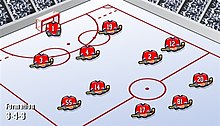This article needs additional citations for verification .(February 2024) |

In team sports, a position is the role and placement of an individual player within the arrangement of players on the field of play during a game.
Contents
Many sports measure performance of individual players based on standards for their specific positions.[ citation needed ] Players' suitability for certain positions is often linked to specific attributes and skill requirements. [1]
For information about team or player positions in some particular sports, see:
